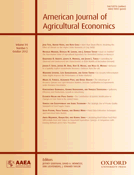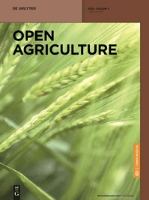
JOURNAL OF AGRICULTURAL & ENVIRONMENTAL ETHICS
Scope & Guideline
Cultivating Insights for a Sustainable Future
Introduction
Aims and Scopes
- Ethical Analysis of Agricultural Practices:
The journal focuses on the ethical implications of various agricultural practices, including the treatment of animals, the use of biotechnology, and the impact of farming on ecosystems. - Interdisciplinary Perspectives on Environmental Ethics:
It encourages contributions that integrate insights from philosophy, sociology, environmental science, and economics to provide a holistic understanding of ethical issues in agriculture and environmental management. - Social Justice and Food Systems:
The journal addresses social justice issues related to food production and distribution, exploring the rights to food, food sovereignty, and the implications of global inequalities on local food systems. - Exploration of Non-Human Agency:
A significant focus is placed on the moral consideration of non-human entities, including animals and ecosystems, and how their agency can influence ethical decision-making in agriculture. - Community Engagement and Environmental Discourse:
The journal promotes research that emphasizes community-centered approaches to environmental management, highlighting local knowledge and practices in sustainable agriculture.
Trending and Emerging
- Climate Justice and Ethical Food Systems:
Recent publications highlight the intersection of climate justice with food systems, emphasizing the ethical responsibilities of individuals and communities in addressing climate change through sustainable practices. - Interspecies Relationships and Justice:
There is a growing interest in exploring interspecies justice, particularly in how ethical frameworks can be applied to understand and improve the relationships between humans and non-human animals. - Feminist Perspectives in Environmental Ethics:
Emerging research is increasingly incorporating feminist perspectives into environmental ethics, challenging traditional power dynamics and advocating for more inclusive practices in agricultural systems. - Community-Centered Approaches to Environmental Management:
Recent trends show a rise in research focused on community engagement and participatory approaches to environmental management, promoting local knowledge and practices as vital components of sustainability. - Ethics of Technological Innovations in Agriculture:
There is a notable increase in discussions around the ethical implications of technological innovations, such as genomic editing and automation in agriculture, reflecting the need for critical ethical evaluations in these rapidly evolving fields.
Declining or Waning
- Traditional Agricultural Ethics:
There has been a noticeable decrease in discussions surrounding traditional agricultural ethics, as newer frameworks that incorporate contemporary social justice and ecological considerations gain traction. - Purely Economic Perspectives on Agriculture:
Research that focuses solely on the economic aspects of agriculture, such as profitability and efficiency, is becoming less prevalent, as ethical and environmental dimensions are increasingly prioritized. - Anthropocentric Environmental Ethics:
The journal has seen a waning interest in anthropocentric approaches that prioritize human interests over ecological considerations, aligning with a broader shift towards more ecocentric and relational ethical frameworks. - Static Views on Animal Welfare:
There is a declining focus on static or traditional views of animal welfare, with more emphasis now being placed on dynamic and relational approaches that consider the broader ecological and ethical contexts. - Conventional Food Production Systems:
Research centered around conventional food production systems is becoming less prominent, as there is a growing interest in alternative, sustainable practices and systems.
Similar Journals

Future of Food-Journal on Food Agriculture and Society
Empowering Voices in Food, Agriculture, and SocietyThe Future of Food-Journal on Food Agriculture and Society, published by Kassel University Press GmbH, serves as a vital platform for emerging research at the intersection of food, agriculture, and societal impacts. With an ISSN of 2197-411X and operating within the realms of Agronomy, Ecology, and Food Science, this journal is pivotal for researchers and professionals aiming to address contemporary challenges in the food sector. Although currently ranked in the fourth quartile across its scholarly categories (2023), the journal showcases a wealth of innovative studies, critical analyses, and global perspectives that strive to enhance our understanding of sustainable agriculture practices, food security, and environmental stewardship. The Open Access format encourages wide dissemination and engagement with research findings, making it an essential resource for students and academics alike. As the journal converges from 2013 to 2024, it aims to foster discussions that will shape the future of food systems worldwide.

Journal of Practical Ethics
Fostering Open Dialogue on Practical EthicsJournal of Practical Ethics is an esteemed open-access journal published by the Oxford Uehiro Centre for Practical Ethics, dedicated to enhancing the discourse surrounding ethical issues in various fields, including healthcare, technology, and social policy. Since its inception in 2013, the journal has fostered a robust academic platform for researchers, professionals, and students to explore and publish innovative ideas and solutions to real-world ethical dilemmas. The journal's commitment to making research freely accessible emphasizes its role in bridging the gap between academic inquiry and practical application, thereby encouraging a broader engagement with ethical considerations across disciplines. As the importance of ethical frameworks continues to grow in an increasingly complex world, the Journal of Practical Ethics stands as a vital resource for those seeking to influence policy and practice through rigorous ethical analysis.

Journal of Agricultural Sciences
Connecting global scholars in agricultural sciences.Journal of Agricultural Sciences is an esteemed peer-reviewed journal dedicated to advancing research and knowledge in the field of agricultural and biological sciences. Published by Sabaragamuwa University of Sri Lanka, this journal has been an open access platform since 2005, providing valuable insights and innovative findings to a global audience. With an ISSN of 1391-9318 and an E-ISSN of 2386-1363, the journal currently holds a Q3 ranking in the Agricultural and Biological Sciences category, reflecting its commitment to maintaining high standards of scholarship. The journal's Scopus ranking places it at #102 out of 193 in its field, signifying its impact and relevance. Covering a wide range of topics from sustainable agriculture practices to advancements in biological research, the Journal of Agricultural Sciences serves as a crucial resource for researchers, professionals, and students alike, fostering knowledge exchange and promoting agricultural innovation. We invite you to explore our rich repository of research and contribute to the ongoing discourse in the vital area of agricultural sciences.

Nature + Culture
Exploring the Interplay of Environment and SocietyNature + Culture, published by BERGHAHN JOURNALS, focuses on the interdisciplinary exploration of cultural and environmental relationships, bridging the gap between the social sciences and ecological studies. With its ISSN 1558-6073 and E-ISSN 1558-5468, this journal has established itself as a key platform for scholars aiming to advance discussions in an era of rapid environmental change and cultural transformation. Operating from the United States, specifically at 20 Jay St, Suite 512, Brooklyn, NY 11201, it holds a respectable position within the academic community, evidenced by its Q3 ranking in Social Sciences (miscellaneous) for 2023 and its Scopus rank of #132 out of 275 in General Social Sciences. While currently not an Open Access journal, Nature + Culture provides vital insights that address the pressing issues of our time, making it an essential resource for researchers, professionals, and students committed to understanding the intersection of nature and human culture from 2008 through its converging years into 2024.

Etica & Politica
Transforming Academic Discourse in Ethics and PoliticsEtica & Politica is a distinguished open access journal published by UNIV STUDI TRIESTE, EDIZIONI UNIVERSITA TRIESTE-EUT, focusing on the interconnected fields of philosophy, sociology, and political science. With an ISSN of 1825-5167, this journal has been a platform for scholarly dialogue and research dissemination since its inception in 1999, making it an essential resource for researchers, professionals, and students alike. Despite its current classification in the Q4 quartile for both Philosophy and Sociology/Political Science categories, Etica & Politica is committed to fostering interdisciplinary discussions that challenge prevailing paradigms and encourage innovative thought. Covering a converged time frame from 2013 to 2023, the journal offers an invaluable repository of insights and analyses that contribute to the academic discourse on ethics and politics, and strives to elevate its presence through rigorous peer review and scholarly contributions. Based in Italy, it continues to attract a diverse range of academic perspectives and invites contributors to engage in a vibrant intellectual community.

Ethics & Bioethics
Navigating the complexities of ethics in modern society.Ethics & Bioethics is a vital interdisciplinary journal published by DE GRUYTER POLAND SP Z O O, focusing on the ethical dimensions of biological and medical practices. Since its transition to an Open Access model in 2016, the journal has become more accessible, promoting the dissemination of high-quality research to a broader audience. Based in Warsaw, Poland, this journal contributes significantly to the discourse on ethical practices in health policy, education, and philosophy, as evidenced by its impressive Scopus rankings, including a Q1 quartile in Philosophy. Covering a wide spectrum of ethical issues and dilemmas faced in contemporary society, Ethics & Bioethics provides a platform for researchers, professionals, and students to engage with cutting-edge scholarship aimed at advancing understanding and fostering dialogue in the ever-evolving landscape of bioethics. With a commitment to rigorous peer review and academic integrity, this journal is pivotal for those seeking to enhance their knowledge and contribute to the field.

AMERICAN JOURNAL OF AGRICULTURAL ECONOMICS
Illuminating Trends in Agricultural Policy and EconomicsThe American Journal of Agricultural Economics, published by Wiley, stands as a premier peer-reviewed journal in the fields of Agricultural and Biological Sciences and Economics and Econometrics. Established in 1919, this esteemed journal has a history of contributing significant research and insights that shape agricultural policies and economic frameworks. With an impressive Q1 ranking in both stated categories and maintaining a notable standing in the Scopus rankings—Rank #7 out of 193 in Agricultural and Biological Sciences and Rank #71 out of 716 in Economics—this journal is recognized for its high-quality scholarship and impactful research findings. Researchers, professionals, and students alike will find a wealth of knowledge within its pages, addressing critical issues in agricultural economics and providing cutting-edge analyses that inform both theory and practice. Stay ahead of the curve in this dynamic field by engaging with the American Journal of Agricultural Economics, where future trends and innovative solutions meet scholarly excellence, enriching our understanding of the agricultural economy.

Journal of Rural Studies
Empowering Rural Discourse Through ScholarshipWelcome to the Journal of Rural Studies, a premier peer-reviewed publication dedicated to advancing the field of rural research. Published by PERGAMON-ELSEVIER SCIENCE LTD, this esteemed journal has been a cornerstone of scholarly discourse since its inception in 1985 and continues to evolve through 2024. With an impressive impact factor and categorization in the Q1 tier across various fields, including Development, Forestry, Geography, Planning and Development, and Sociology and Political Science, the journal is among the elite voices in rural studies. Researchers, professionals, and students alike will find invaluable insights within its pages, supported by rigorous empirical research and theoretical explorations that address the complexities of rural life and its myriad challenges. While it currently does not offer open access, the subscription model ensures a broad dissemination of knowledge, fostering collaboration and innovation within the academic community. With a robust Scopus ranking that places it in the top percentiles across multiple social sciences, the Journal of Rural Studies remains an essential resource for those dedicated to understanding and improving rural environments worldwide.

Open Agriculture
Driving Change in the Agricultural LandscapeOpen Agriculture, published by DE GRUYTER POLAND SP Z O O, is an innovative open-access journal dedicated to advancing research in the Agricultural and Biological Sciences. Since its inception in 2016, this journal has been committed to disseminating knowledge and facilitating collaboration among researchers, professionals, and enthusiasts in the agricultural sector. With an impressive Q2 ranking in the Agricultural and Biological Sciences category, it holds a prestigious position, ranking #65 out of 221 in its field, placing it in the 70th percentile. Open Agriculture offers a platform for high-quality research across a diverse range of topics, ensuring that crucial findings are readily accessible to the global scientific community. The journal continues to uphold its mission of promoting sustainable agricultural practices and innovations that address contemporary challenges in food security and environmental sustainability. With its strong commitment to open access principles, researchers and students alike can easily engage with cutting-edge research and contribute to the vibrant discourse surrounding modern agriculture.

Journal of Agriculture and Food Research
Pioneering Research for a Sustainable Food SystemJournal of Agriculture and Food Research, published by ELSEVIER, is a premier Open Access journal that has made significant strides in the fields of agricultural and biological sciences since its launch in 2019. With an ISSN of 2666-1543, the journal is headquartered at Radarweg 29, 1043 NX Amsterdam, Netherlands. It holds a remarkable position in the 2023 Category Quartiles, achieving Q1 rankings in Agricultural and Biological Sciences (miscellaneous), Agronomy and Crop Science, and Food Science. The journal's impactful research is reflected in its impressive Scopus ranks, including a ranking of #25 in Agricultural and Biological Sciences, showcasing the journal's commitment to high-quality, innovative research relevant to contemporary agricultural challenges. Researchers, professionals, and students can benefit from its diverse array of published works, fostering a greater understanding of food security, sustainable agriculture, and innovative food technologies. By embracing an open access model, the journal ensures that critical research is readily available to a global audience, aiming to enhance knowledge dissemination in this vital field.